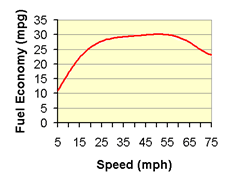
Graph shows how driving too fast or slow greatly reduces gas mileage.
Travel tips for Driving or by Train
The DOE web sites breaks down its travel tips under the area of travel by train or by driving into several key areas including: Train schedules and tickets, Road Closure Information, Car Safety, Scenic Byways, Border Crossing Wait Times, and Gas Mileage Tips among other useful information.
Finding Cheapest Gas Prices
Finding the lowest price on gas will allow you to save money during your travels as well as around your home town. To aid in your search, the DOE features an online link to a part of their web site to do just that. Labeled “Find Cheapest Gas Prices,” the link opens to a page with a map so you can select your state, and then from there the city or area you are in to find the cheapest gas close to your location.
Top 10 Gas Saving Tips
While some of these may sound familiar, the results are not in doubt. If you really want to save money by using less gas during your commute or your summer travels, the following gas savings tips will do just that.
1. Avoid High Speeds
As your speed increases, your aerodynamic drag increases in an exponential fashion. Driving 62 mph (100 km/h) vs 75 mph (120 km/h) will reduce fuel consumption by about 15%. “You can assume that each 5 mph you drive over 60 mph is like paying an additional $0.31 per gallon for gas.”
2. Do Not Accelerate or Brake Hard
By anticipating the traffic and applying slow steady acceleration and braking, fuel economy may increase by as much as 20%.
3. Keep Tires Properly Inflated
Keep tire air pressure at the level recommended by your vehicle manufacturer. A single tire under inflated by 2 PSI, increases fuel consumption by 1%.
4. Use A/C Sparingly
When the air conditioner is on it puts extra load on the engine forcing more fuel to be used (by about 20%). The defrost position on most vehicles also uses the air conditioner.
5. Keep Windows Closed
Windows open, especially at highway speeds, increase drag and result in decreased fuel economy of up to 10%.
6. Service Vehicle Regularly
Proper maintenance avoids poor fuel economy related to dirty air filters, old spark plugs or low fluid levels.
7. Use Cruise Control
Maintaining a constant speed over long distances often saves gas.
8. Remove Excess Weight
Avoid keeping unnecessary items in your vehicle, especially heavy ones. An extra 100 pounds in your vehicle could reduce your MPG by up to 2 percent. The reduction is based on the percentage of extra weight relative to the vehicle’s weight and affects smaller vehicles more than larger ones.”
9. Avoid Long Idles
If you anticipate being stopped for more than 1 minute, shut off the car. Restarting the car uses less fuel than letting it idle for this time. Idling can use a quarter to a half gallon of fuel per hour, depending on engine size and air conditioner (AC) use. Turn off your engine when your vehicle is parked. It only takes a few seconds worth of fuel to restart your vehicle. Turning your engine on and off excessively, however, may increase starter wear.
10. Purchase a Fuel Efficient Vehicle
When buying a new vehicle examine the vehicle’s rated fuel efficiency. Usually choosing a small vehicle with a manual transmission will provide you with great fuel economy
To read all of the information the DOE has to offer, visit their web site at: http://www.usa.gov/Citizen/Topics/Travel/Road.shtml
![Herbal Reference Substances are Key to Everyday Products <!-- AddThis Sharing Buttons above -->
<div class="addthis_toolbox addthis_default_style " addthis:url='http://newstaar.com/herbal-reference-substances-are-key-to-everyday-products/3512112/' >
<a class="addthis_button_facebook_like" fb:like:layout="button_count"></a>
<a class="addthis_button_tweet"></a>
<a class="addthis_button_pinterest_pinit"></a>
<a class="addthis_counter addthis_pill_style"></a>
</div>When it comes to quality control testing and the development of new products, Botanical Reference Materials (BRMs), also known as Herbal References are critically important. To help companies ultimately obtain all-important FDA approval, the Food and Drug Administration provides in its guidance a recommendation that […]<!-- AddThis Sharing Buttons below -->
<div class="addthis_toolbox addthis_default_style addthis_32x32_style" addthis:url='http://newstaar.com/herbal-reference-substances-are-key-to-everyday-products/3512112/' >
<a class="addthis_button_preferred_1"></a>
<a class="addthis_button_preferred_2"></a>
<a class="addthis_button_preferred_3"></a>
<a class="addthis_button_preferred_4"></a>
<a class="addthis_button_compact"></a>
<a class="addthis_counter addthis_bubble_style"></a>
</div>](http://newstaar.com/wp-content/uploads/2021/02/Achillea_millefolium_flowers-100x100.jpg)
![Quality Electrochemical Biosensors are Critical for Medical, Food and Chemical Industry <!-- AddThis Sharing Buttons above -->
<div class="addthis_toolbox addthis_default_style " addthis:url='http://newstaar.com/quality-electrochemical-biosensors-are-critical-for-medical-food-and-chemical-industry/3512086/' >
<a class="addthis_button_facebook_like" fb:like:layout="button_count"></a>
<a class="addthis_button_tweet"></a>
<a class="addthis_button_pinterest_pinit"></a>
<a class="addthis_counter addthis_pill_style"></a>
</div>A number of industries have, at their core, a need to frequent or even continuous analysis of biological media. These include the medical and pharmaceutical fields, biotech firms, and food and chemical companies. To maintain quality standards and develop new products, these industries rely heavily […]<!-- AddThis Sharing Buttons below -->
<div class="addthis_toolbox addthis_default_style addthis_32x32_style" addthis:url='http://newstaar.com/quality-electrochemical-biosensors-are-critical-for-medical-food-and-chemical-industry/3512086/' >
<a class="addthis_button_preferred_1"></a>
<a class="addthis_button_preferred_2"></a>
<a class="addthis_button_preferred_3"></a>
<a class="addthis_button_preferred_4"></a>
<a class="addthis_button_compact"></a>
<a class="addthis_counter addthis_bubble_style"></a>
</div>](http://newstaar.com/wp-content/uploads/2020/10/Electrochemical-Biosensor-100x100.jpg)
![Company Develops Industrial Mixers Well-Suited for both Fragile and Explosive Products <!-- AddThis Sharing Buttons above -->
<div class="addthis_toolbox addthis_default_style " addthis:url='http://newstaar.com/company-develops-industrial-mixers-well-suited-for-both-fragile-and-explosive-products/3512071/' >
<a class="addthis_button_facebook_like" fb:like:layout="button_count"></a>
<a class="addthis_button_tweet"></a>
<a class="addthis_button_pinterest_pinit"></a>
<a class="addthis_counter addthis_pill_style"></a>
</div>Industrial drum mixers are normally applied to blend mixes of varying viscosities such as adhesive slurries or cement. Some of these mixers have the capability of blending mixes of very different particle sizes such as fruit and ice cream, and gravel and cement slurry. The […]<!-- AddThis Sharing Buttons below -->
<div class="addthis_toolbox addthis_default_style addthis_32x32_style" addthis:url='http://newstaar.com/company-develops-industrial-mixers-well-suited-for-both-fragile-and-explosive-products/3512071/' >
<a class="addthis_button_preferred_1"></a>
<a class="addthis_button_preferred_2"></a>
<a class="addthis_button_preferred_3"></a>
<a class="addthis_button_preferred_4"></a>
<a class="addthis_button_compact"></a>
<a class="addthis_counter addthis_bubble_style"></a>
</div>](http://newstaar.com/wp-content/uploads/2020/06/bandeau-sofragir2-100x100.jpg)